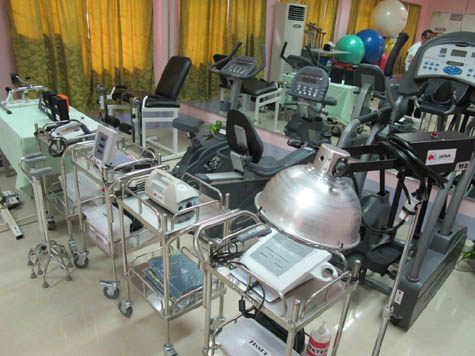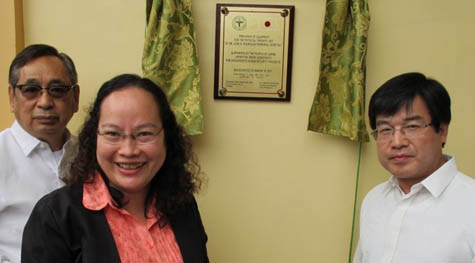Minister for Economic Affairs Akio Isomata of the Embassy of Japan (3 rd from the left) attended the turnover ceremony of The Project for Provision of Equipment for the Physical Therapy Unit of Dr. Jose N. Rodriguez Memorial Hospital in Caloocan City on March 16, 2011. The photo also shows Department of Health (DOH) Assistant Secretary Pauline Ubial (2 nd from the left) and Dr. Edgardo Javillonar (1 st from the left), Chief of Sanitarium of Dr. Jose N. Rodriguez Memorial Hospital.
|

The newly procured equipment for the Physical Therapy Unit of Dr. Jose N. Rodriguez Memorial Hospital.
|
Minister for Economic Affairs Akio Isomata of the Embassy of Japan attended the turnover ceremony of “ The Project for Provision of Equipment for the Physical Therapy Unit of Dr. Jose N. Rodriguez Memorial Hospital ” in Caloocan City on March 16, 2011. Department of Health (DOH) Secretary Enrique Ona and Dr. Edgardo Javillonar, Chief of Sanitarium, Dr. Jose N. Rodriguez Hospital, also witnessed the turnover. The project, amounting to US$76,474 (approximately 3.5 million pesos), is funded through the Embassy of Japan's Grant Assistance for Grassroots Human Security Projects ( GGP ).
Dr. Jose N. Rodriguez Memorial Hospital, located in Caloocan City, was established in 1940 as one of the facilities to accommodate Leprosy or Hansen disease patients. When the disease was no longer considered as a public health problem by the Department of Health (DOH) and World Health Organization (WHO), the sanitarium of the hospital was converted into a general hospital. Now, the hospital provides general medical services for around 9,000 patients per year.
One of the services that the hospital provides is the physical therapy for rehabilitation of post Hansen patients as well as other patients who suffer from physical paralysis. However, due to the limited physical therapy equipment, the hospital had difficulty in providing comprehensive intervention services for its clients.
Under these circumstances, Dr. Jose N. Rodriguez Memorial Hospital sought assistance from the Embassy of Japan to purchase 31 pieces of physical therapy equipment. With this project, the hospital will be able to provide quality health services for about 550 patients per month.
In his speech, Minister Isomata stated that Japan had always considered health as a highly important field of humanitarian assistance because of its direct impact on the lives of individuals. He also stressed that Japan continues to cooperate with the Philippine Government in this field, based on Kan Commitment announced on the occasion of UN MDGs Summit last year, in which Japan committed the assistance of 5 billion dollars in the health sector in the five years commencing in 2011 .
Japan, as the top donor of the official development assistance for the Philippines, launched GGP in the Philippines in 1989 for the purpose of reducing poverty and helping various communities engaged in grassroots activities. GGP also contributes to the ensuring of “human security,” which is one of the major pillars of Japan's diplomacy and aims to empower vulnerable people to protect themselves from various threats. As of March 2011, 441 grassroots projects funded by GGP – ranging from roughly 1 to 4 million pesos – have been implemented by NGOs, local government units and other non-profit organizations. The total grant for these projects so far amounts to US$19,834,078. It is expected that this project will further contribute to strengthening the friendly ties between the peoples of Japan and the Philippines as well as fostering a strategic partnership between the two countries towards the future.
Japan has also been a leading advocate of elimination of discrimination against persons affected by leprosy and their family members. Lately, the resolutions on “Elimination of Discrimination against Persons Affected by Leprosy and their Family Members,” under the main sponsorship of the Japanese Government, have been adopted for three consecutive years commencing in 2008 at the United Nations Human Rights Council in Geneva. In December 2010, the resolution was also unanimously adopted at the plenary meeting of the United Nations General Assembly in New York. Through the activities mandated by these resolutions, the “Principles and guidelines for the elimination of discrimination against persons affected by leprosy and their family members” are also developed for requesting and encouraging governments and other actors to act for resolving the issue of prejudice and discrimination stemming from misinformation about and misunderstanding of the disease.



